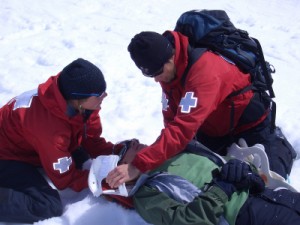
Today’s guest on our blog radio show, Let’s Talk Personal Safety, was Andrew Cull, founder and CEO or Remote Medical, a Seattle based operation. Andrew is a Tactical and Remote Area Paramedic.
Remote Medical provides a wide variety of service and equipment for those operating recreationally or on work related projects in places where if something goes wrong, access to a hospital will not be an option.
Remote Medical is one of our go to partners for anyone traveling abroad who needs expert council on the medical component of preparedness and planning.
Here is one area Andrew reinforced and that we always press on in all our travel safety classes:
The importance of having a small first aid kit or “go pack” with you wherever you are.
This is a small kit that contains the things you will need if for some reason circumstances don’t allow you to get back to your hotel and baggage at the end of a day touring, hiking etc
This kit should contain some basic first aid items to include alcohol wipes, band aids and some bandages. Andrew also suggests getting a prescription of Cipro, a strong antibiotic to fend off any powerful bacterial infections that can rapidly degrade ones health if not addressed immediately. Andrew also reminded us of the importance of carrying some iodine tablets to purify any water if boiling it is not an option. He mentioned that filters are good but to think about the risk of breakage or cracking especially in very cold weather. And he would know. Andrew is also a high altitude climber. We were also reminded of the incidence of stomach conditions easily contracted in developing nations that lead to diarrhea. Severe diarrhea especially in very warm climates can lead to rapid dehydration. A small pouch of Serolyte powder, an electrolyte replacement, we were told, can make up to a liter of vital replenishing fluid!
I asked Andrew to break down the logistics of bringing a two or three day supply of other prescription medications along in this first aid kit. These might be high blood pressure meds, anti depressants, and other therapeutic agents to be taken daily. I learned that you can ask your doctor to actually provide small prescription envelopes containing limited supplies of each medication with the appropriate documentation affixed to each. This allows you to bring a limited supply with you without running into any legal hassles at border post and crossings when abroad. Having a letter from your doctor describing each condition and the medication to address each ailment is worth obtaining. Another Remote Medical sales executive who handles military and government accounts for the company even suggested laminating this letter to protect it from water a and wear and tear. The balance of your prescriptions may now reside in our luggage in their standard containers as obtained from the pharmacy.
If you have what the TSA calls “hidden disabilities” such as diabetes, you are allowed to bring your insulin and hypodermic syringes with you in the cabin. The same goes for EpiPens® which are provided to those with allergies to bee stings, shell fish etc. Again, Andrew reminds us that good documentation and disclosure at check in for the flight will lead to a smooth transition onto the aircraft.
My next question stemmed from a lesson I learned the hard way when out in a remote area of Sub Saharan Africa inadequately prepared. Nutrition, keeping warm and light. Simply put, Andrew reinforced the importance of bringing a couple of energy bars, a flashlight, and perhaps one with a head band mount option as well as a very light Mylar blanket. Apparently you can get these blankets in various configurations such that they will also cover the head area from which we irradiate about 25% of body heat. Mylar is that blanket that looks like tin foil and reflects your heat back to your body surface.
The one statement Andrew made which really resonates with us in the safety training area is this. People who are well prepared, have good strategies in place and stick to their plans most often have uneventful and enjoyable vacations and adventures.
Andrew and I covered a lot more that what I have nut shelled above and you might want to listen to my full interview with him at www.blogtalkradio.com/letstalkpersonalsafety
